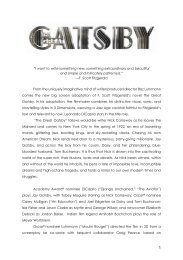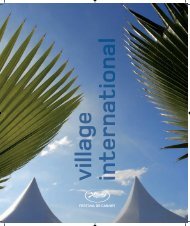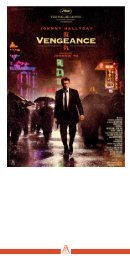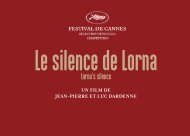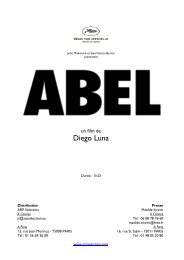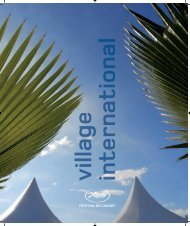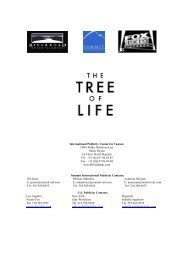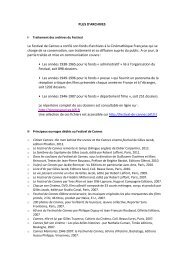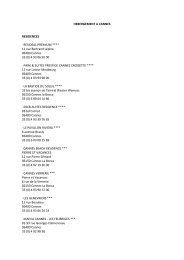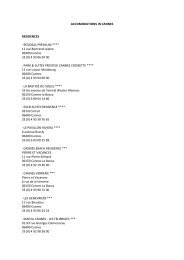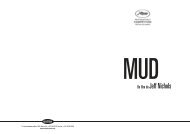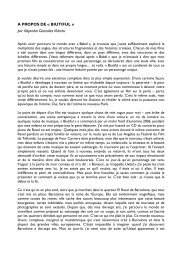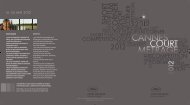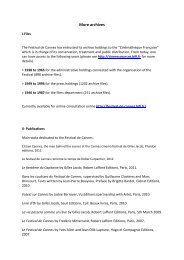download notes (eng) - film press plus - richard lormand
download notes (eng) - film press plus - richard lormand
download notes (eng) - film press plus - richard lormand
Create successful ePaper yourself
Turn your PDF publications into a flip-book with our unique Google optimized e-Paper software.
Illuminations Films and Kick the Machine Films present in association with ARTE France - La Lucarne and with the participation of The Match Factory<br />
MEKONG HOTEL แม่โขงโฮเต็ล Starring Jenjaira Pongpas, Maiyatan Techaparn, Sakda Kaewbuadee, Chai Bhatana, Chatchai Suban Production Manager Chaisiri Jiwarangsan<br />
Assistant Director Chatchai Suban Account Administrator Parichat Pu-arree Music Chai Bhatana Sound Chalermrat Kaweewattana Sound Design Akritchalerm Kalayanamitr<br />
Executive Producers Simon Field, Keith Griffiths Commissioning Editor Luciano Rigolini for ARTE France - La Lucarne Post Production supported by Jacob Burns Film Center with additional<br />
support from Fuori Orario (Rai Tre) Filmed, Edited, Directed and Produced by Apichatpong Weerasethakul World Film Sales The Match Factory
Mekong Hotel is a portrait of a hotel near the Mekong River in the north-east of Thailand. The river there marks the border<br />
between Thailand and Laos. In the bedrooms and terraces, Apichatpong held a rehearsal with his crew for a movie that he<br />
wrote years ago called Ecstasy Garden.<br />
The <strong>film</strong> shuffles different realms, fact and fiction, ex<strong>press</strong>ing the bonds between a vampire-like<br />
mother and her daughter, the young lovers and the river. Mekong Hotel - since it was shot at<br />
the time of the heavy flooding in Thailand - also weaves in layers of demolition, politics, and a<br />
drifting dream of the future.<br />
en a vampire-like<br />
ce it was shot at<br />
on, politics, and a
Apichatpong Weerasethakul has come to be recognised as one of the most original voices in cinema today. His five feature <strong>film</strong>s,<br />
short <strong>film</strong>s and installations have won him widespread international recognition and numerous festival prizes, culminating in the<br />
winning of the Cannes Palme d’Or in 2010 with Uncle Boonmee Who Can Recall His Past Lives. His previous feature Syndromes<br />
and a Century (2006) was recognised as one of the best <strong>film</strong>s of the last decade in several 2010 polls.<br />
Apichatpong ha<br />
included the m<br />
Apichatong began making <strong>film</strong>s and video shorts in 1994 and completed his first feature in 2000. Lyrical and<br />
often fascinatingly mysterious, his works are non-linear, dealing with memory and in subtle ways invoking<br />
personal politics and social issues. Working independently of the Thai commercial <strong>film</strong> industry, he devotes<br />
himself to promoting experimental and independent <strong>film</strong>making through his production company Kick the<br />
Machine Films, founded in 1999.<br />
Apichatpong has also mounted exhibitions and installations in many countries since 1998. His installations have<br />
included the multi-screen project Primitive (2009), which was complimented by Uncle Boonmee and which has been<br />
acquired for major museum collections and was presented at the Haus der Kunst, Munich, the Musee d’Art Moderne de<br />
la Ville de Paris and The New Museum, New York among others. He will make a major installation for the 2012 Kassel<br />
Documenta. His most recent projects include on-line <strong>film</strong>s for Mubi (Ashes, 2012) and the Walker Art Center in the USA<br />
(Three Wonders of the World, 2012).<br />
He is currently working on a project focussing on the Mekong River at the Thai-Laotian border.<br />
acquired for m<br />
la Ville de Pari<br />
Documenta. Hi<br />
(Three Wonder<br />
He is currently
Feature Films<br />
Uncle Boonmee Who Can Recall His Past Lives / Lung<br />
Boonmee Raluek Chat, 2010<br />
Syndromes and a Century / Sang Sattawat, 2006<br />
Tropical Malady / Sud Pralad, 2004<br />
The Adventure of Iron Pussy / Huajai Toranong, 2003<br />
Blissfully Yours / Sud Sanaeha, 2002<br />
Mysterious Object at Noon / Dokfar Nai Meu Marn, 2000<br />
Selected Recent Installations* and Shorts<br />
Mekong Hotel, 2012<br />
Ashes, 2012<br />
Sakda (Rousseau), 2012<br />
*For Tomorrow For Tonight, 2011<br />
Monsoon, 2011<br />
M Hotel, 2011<br />
*A Man Who Ate an Entire Tree, 2010<br />
*The Primitive Project, 2009<br />
*Phantoms of Nabua, 2009<br />
A Letter to Uncle Boonmee, 2009<br />
Mobile Men, 2008<br />
Vampire, 2008<br />
*Unknown Forces, 2007<br />
*Emerald / Morakot, 2007<br />
Luminous People 2007<br />
nstallations* and Shorts<br />
12<br />
2012<br />
r Tonight, 2011<br />
an Entire Tree, 2010<br />
ject, 2009<br />
ua, 2009<br />
Boonmee, 2009<br />
8<br />
, 2007<br />
ot, 2007<br />
2007
Apichatpong talks about<br />
Weerasethakul<br />
Tell us a little about the music in the <strong>film</strong> that you chose to lay across the whole <strong>film</strong> in a very particular way.<br />
This is very unusual in your <strong>film</strong>s. Who is the guitarist?<br />
I wanted to try to go against what I was used to. I imagined music that flows like water. It is eternal and always transforming,<br />
with minute variations. The guitarist is a long lost high school friend whom I recently met. I found out he<br />
was teaching classical guitar and occasionally performed in bars. We had a lot to catch up on. To feature him and his<br />
creation in the <strong>film</strong> is like creating a dialogue with a friend with whom I shared a lot when we were young together in<br />
this north-eastern land.<br />
Tell us a<br />
This is ve<br />
I wanted<br />
forming,<br />
was teach<br />
creation i<br />
this north<br />
Could you say something about the process of making MEKONG HOTEL?<br />
My actress, Jenjira is from the city of Nong Khai. For the past few years she has moved back home to recuperate, after<br />
one of her legs was damaged in a motorcycle accident. I visited her from time to time at her house not far from the<br />
Mekong River. Sometimes the place would flood badly, sometimes it dried out. The river is living and communicating.<br />
I started to make photos and videos at her place, at the river. I stayed at various hotels during my visits. So I dreamt up<br />
a <strong>film</strong> about home, a temporary one or a comfort zone we shelter in; and the river that produces music.
Can you say something about the location? The Mekong River in the north-east of Thailand (where you shot Primitive and Uncle<br />
Boonmee) marks the border between Thailand and Laos. There has already been a reference to the relationship between Thai and Lao<br />
in your last feature, because Uncle Boonmee’s ‘carer’ is from Laos.<br />
This place that we shot Mekong Hotel is a border town between Thailand and Laos. Both countries had seen big changes in the 60s-<br />
70s with the invasion of Communism. People used to be able to commute between the two countries easily, but after the civil war<br />
in Laos, it became a mysterious country, semi-isolated. The Mekong River is no longer a bridge, but a barrier. Prejudice towards Lao<br />
people grew in central Thailand and in the media. I guess because of this isolation and the wayward nationalism in Thailand.<br />
Can you tell us a little more about Ecstasy Garden, scenes from which are being rehearsed in Mekong Hotel.<br />
Is it an abandoned project?<br />
It is one of my impossibly expensive projects. I drafted it in 2002. Now and then, Jenjira’s daughter from Bangkok, Namphon,<br />
paid her a visit. The sight of the two women together reminded me of the story I had written called Ecstasy Garden. It focuses<br />
on a mother-daughter relationship through several centuries. The mother is of a vampire-like species from another planet who<br />
lives in Thailand’s north-east. In the story, the daughter was in love with a teenage man whose family owned a banana plantation.<br />
She did not realise her mother was a ghost. This ghost was like a vampire: it ate raw human and animal flesh. She kills and eats<br />
her own daughter while the daughter is at the height of her romance. Later, the mother’s alien spirit is kept in a clay pot underwater.<br />
Meanwhile, the daughter’s spirit keeps following her man in his various reincarnations, in different countries. All along<br />
the mother and daughter communicate telepathically.<br />
n Mekong Hotel.<br />
aughter from Bangkok, Namphon,<br />
called Ecstasy Garden. It focuses<br />
species from another planet who<br />
family owned a banana plantation.<br />
and animal flesh. She kills and eats<br />
n spirit is kept in a clay pot under-<br />
s, in different countries. All along
ECSTASY GARDEN seems to have been a ghost story that relates specifically to the horror/ghost story tradition in<br />
Thai cinema? What is a Pob ghost?<br />
A Pob ghost is a famous north-eastern kind of ghost. When ‘infected’ or ‘possessed’ by its spirit, a man or a woman<br />
becomes hungry for raw flesh and blood, wandering the village at night to gobble up the neighbours’ livestock.<br />
I grew up with this belief, hearing this and that person were Pobs. There is a series of Pob ghost movies that popularises<br />
Pob as a middle-age woman. The last instalment was just released last year in which the Pob is instructed by<br />
her doctor to become a vegetarian.<br />
Your Primitive<br />
Nabua and Isan<br />
The story of Jen<br />
When I worked<br />
The synopsis of MEKONG HOTEL mentions your shuffling of ‘different realms’, Seen in terms of levels of ‘reality’ this<br />
seems very characteristic of many of your <strong>film</strong>s but here you also speak of ‘fact and fiction’ and the <strong>film</strong> shifts constantly<br />
between the two.<br />
I think I am pretending to mean reality when I say ‘fact’. But in movies, reality doesn’t exist. One is just trying to<br />
capture moments and reconstruct them to simulate your view, your understanding. This <strong>film</strong> is conscious of these layers<br />
and levels of distortion. So I think that it can be called a ‘documentary’ in a classical sense. It is a contemplation on<br />
making a fiction.<br />
Your Primitive Project, which was also shot in the north-east of Thailand touched on political issues and the ‘hidden history’ of<br />
Nabua and Isan province. MEKONG HOTEL does too, particularly through the conversations in the <strong>film</strong> and Jenjira’s recollections.<br />
The story of Jenjira is foreign to me. I always see her with her crochet kit. It is hard to imagine her holding an M -16, ready to kill.<br />
When I worked on the Primitive Project and listened to these kind of stories, I felt the need to be more familiar with Thailand. The<br />
country’s education system sometimes comes in the form of brainwashing, even now. So the <strong>film</strong> is a self re-education. Then it is not<br />
so foreign when you understand that people fought and got killed in the streets. You sense that the country is collapsing, but you<br />
cannot leave because you have so many memories and so much pleasure in the country.<br />
country’s educa<br />
so foreign whe<br />
cannot leave b
The conv<br />
The conversations in the <strong>film</strong> often touch on the fact that you were shooting at the time of the floods in Thailand.<br />
Yes. We called home and checked on the news when we were not shooting. Naturally we just talked about water.<br />
I was a little annoyed that the government tried at all costs to save Bangkok , giving it a priority, when Bangkokians<br />
have way more time and resources to defend themselves. The smaller cities near the Mekong have been faced with the<br />
floods periodically. They have less support and they don’t complain as much. And of course this hydroelectric dam, the<br />
Xayaburi in Laos, is alarming. It is pure greed, this politics. Building dams is easy, and brings easy money. We are so<br />
ignorant about alternative energy options. We are so used to, and spoiled, by concrete.<br />
Yes. We<br />
I was a l<br />
have wa<br />
floods pe<br />
Xayaburi<br />
ignorant<br />
Is MEKONG HOTEL the first part of a much more substantial Mekong Project, which will include your next feature?<br />
I hope so, and hope that it won’t join those impossibly expensive projects! We can be modest and shoot only in a hotel.<br />
It is so convenient to have a bed on the set.<br />
Mekong Hotel was commissioned for the ARTE France programming strand La Lucarne. Recent commissions from Editor<br />
Luciano Rigolini have included documentaries by Alexander Sokurov, Alain Cavalier, Kawase Naomi, Stephen Dwoskin,<br />
Ben Rivers and Ben Russell, and many others.<br />
Cast<br />
Jenjira Pongpas<br />
Maiyatan Techaparn<br />
Sakda Kaewbuadee<br />
Apichatpong Weerasethakul<br />
Chai Bhatana<br />
Chatchai Suban<br />
Crew<br />
Production Manager<br />
Chaisiri Jiwarangsan<br />
Assistant Director<br />
Chatchai Suban<br />
Sound<br />
Chalermrat Kaweewattana<br />
Music<br />
Chai Bhatana<br />
Sound Design<br />
Akritcharlerm Kalayanamitr<br />
Filmed, Edited, Directed and Produced by<br />
Apichatpong Weerasethakul<br />
Executive produced by<br />
Simon Field and Keith Griffiths/<br />
Illuminations Films<br />
Commissioning Editor for ARTE France –<br />
La Lucarne<br />
Luciano Rigolini<br />
Technical details<br />
Sound: Dolby 5.1 | Color, 2012<br />
Language: Thai | L<strong>eng</strong>th: 57 minutes<br />
Format: DCP
WORLD SALES:<br />
The Match Factory GmbH<br />
Balthasarstrasse 79-81<br />
50670 Cologne<br />
Germany<br />
Tel : +49 221 539 70 9 - 0<br />
Fax: +49 221 539 70 9 - 10<br />
www.the-match-factory.com<br />
OFFICE IN CANNES:<br />
Residence Villa Royale/3rd Floor<br />
40, boulevard de la Croisette<br />
Access via 29, rue Commandant Andre<br />
Tel: +33 (0) 497 065 909<br />
INTERNATIONAL PRESS:<br />
Richard Lormand - FILM|PRESS|PLUS<br />
Tel: +33 (9) 7044 9865 / +33 (6) 2424 1654<br />
IntlPress@aol.com<br />
www.FilmPressPlus.com



